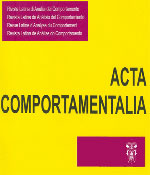Análise Funcional e Variabilidade Comportamental: Algumas Considerações
Contenido principal del artículo
Resumen
Este artigo pretende analisar o conceito de variabilidade e o papel que tem desempenhado essa noção na esfera da análise experimental do comportamento. Apresentamos inicialmente uma definição formal de análise funcional. Apoiados em Sidman, damos urna primeira definição de variabilidade. Demonstramos que a variabilidade viola a definição de relação funcional e constitui um problema para a pesquisa empírica. Mostramos, por outro lado, que a variabilidade pode constituir, em si, objeto da investigação comportamental. Observamos que, passando à qualidade de variável dependente, a definição de variabilidade sofre uma reformulação. Descrevemos alguns estudos que adotaram essa perspectiva. Para Sidman, estudar a variabilidade do comportamento implica estudar as propriedades cíclicas do comportamento. Mostramos, no entanto, queo estudo da variabilidade é mais amplo e geral. Retomamos o conceito de variabilidade, propondo uma definição genérica do termo. Defendemos que o estudo da variabilidade é legítimo, ainda que se lhe recuse conferir o status de dimensão fundamental do comportamento. Concluímos, por fim, que são três basicamente as formas de lidar com a variabilidade' 1 - tenta-se eliminá-la, buscando as variáveis responsáveis pela sua ocorrência, 2 - estuda-se a variabilidade em si, introduzindo-a nas leis comportamentais. 3 - a variabilidade, não sendo problema nem dado, é incorporada ao corpo de conhecimento por meio do conceito de classe de resposta.
Detalles del artículo
Citas en Dimensions Service

<a rel="license" href="http://creativecommons.org/licenses/by-nc-sa/4.0/"><img alt="Licencia de Creative Commons" style="border-width:0" src="https://i.creativecommons.org/l/by-nc-sa/4.0/88x31.png" /></a><br />Este obra está bajo una <a rel="license" href="http://creativecommons.org/licenses/by-nc-sa/4.0/">licencia de Creative Commons Reconocimiento-NoComercial-CompartirIgual 4.0 Internacional</a>.
